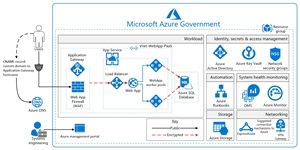News
Azure OpenAI (GPT-4o) Chases Other Cloud AI Services with Federal Security Approval
Nearly three years since its debut, Microsoft's Azure OpenAI passed a security hurdle that allows the cloud AI platform to be used in government agencies and other highly regulated industries. Effectively, Azure OpenAI is catching up to offerings from the other cloud giants, AWS and Google Cloud.
Microsoft this week announced that Azure OpenAI has been approved as a service with FedRAMP High Authorization for Azure Government, following similar approval last year for Azure Commercial. FedRAMP High is the highest level of authorization for cloud services, allowing Azure OpenAI to be used in government agencies and other organizations that require stringent security measures.
 [Click on image for larger view.] Microsoft Azure Government (source: Microsoft).
[Click on image for larger view.] Microsoft Azure Government (source: Microsoft).
FedRAMP, or the Federal Risk and Authorization Management Program, is a government-wide program that standardizes the security assessment, authorization, and continuous monitoring of cloud services. It's designed to ensure that cloud services used by government agencies meet strict security requirements to protect sensitive data and systems.
Microsoft's Douglas Phillips this week announced two updates:
- Azure OpenAI Service is now approved as a service within the FedRAMP High Authorization for Azure Government.
- GPT-4o is now available as part of Azure OpenAI Service for Azure Government and included as part of this latest FedRAMP High Authorization.
A year earlier, Microsoft announced that Azure OpenAI achieved FedRAMP High Authorization for Azure Commercial, which lets government users and developers integrate Azure OpenAI's foundation models into their own cloud apps.
This week's approval helps bring Azure AI more up to speed with rival cloud giant offerings such as Vertex AI from Google Cloud, which achieved FedRAMP High authorization in May.
Vertex AI is a machine learning platform designed to simplify the process of building, training and deploying ML models.
"With the accreditation of the Vertex AI platform and other AI capabilities, public sector customers can harness the power of intelligent capabilities across a diverse set of workloads including translation, speech-to-text, document understanding, call center automation and analytics, predictive analytics, and integration of multi-modal capabilities," Google said. "These services can help optimize resource allocation, enhance citizen interactions, and improve operational resilience and efficiency."
And, just a few weeks ago, AWS, the third cloud giant and recognized leader in the space, announced that its Amazon Bedrock service service achieved FedRAMP High Authorization. Bedrock's purpose is to simplify the creation and scaling of generative AI applications. It offers a choice of high-performing foundation models from leading AI companies through a single API, along with capabilities needed to build generative AI applications with security, privacy, and responsible AI, AWS says.
"Federal agencies, public sector organizations and other enterprises with FedRAMP High compliance requirements can now leverage Amazon Bedrock to access fully managed large language models (LLMs) and other foundation models (FMs)," AWS said.
While perhaps just a tiny front in the cloud giant AI wars, the FedRAMP High Authorization of Azure OpenAI is a significant milestone for Microsoft, which gained an initial lead over its rivals in the AI space with a massive investment into and partnership with OpenAI.
About the Author
David Ramel is an editor and writer at Converge 360.